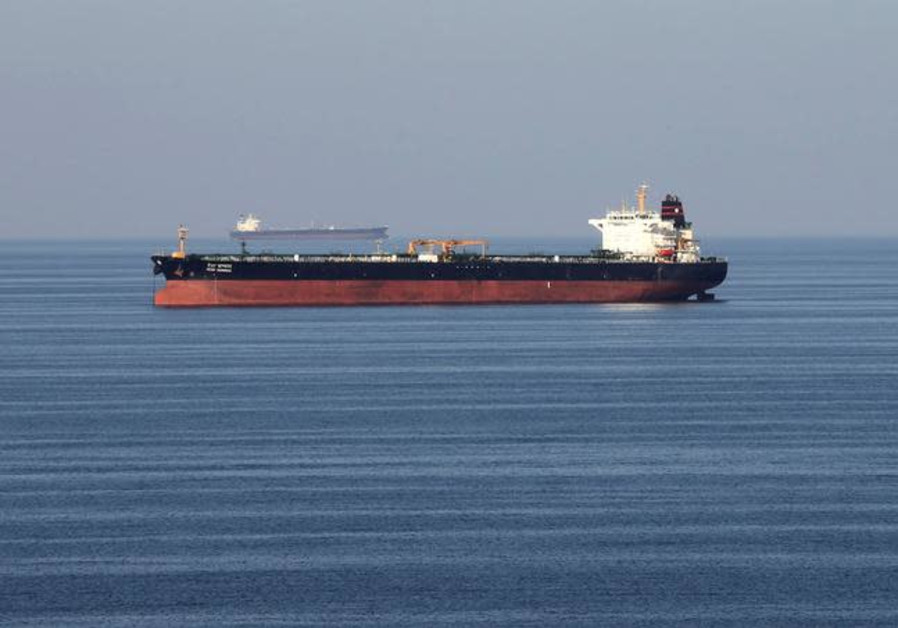U.S. demands Iran free seized ship, vows to protect Gulf oil lifeline

Oil tankers pass through the Strait of Hormuz. (photo credit: REUTERS/HAMAD I MOHAMMED)
DUBAI – The United States on Thursday demanded Iran immediately release a vessel it seized in the Gulf and a U.S. military commander in the region said the United States would work “aggressively” to ensure free passage of vessels through the vital waterway.
Responding to an announcement by Iran’s Revolutionary Guards that they had seized a foreign ship smuggling fuel, the U.S. State Department insisted Iran had to free the ship and its crew and stop harassing vessels in and around the Strait of Hormuz.
The United States blames Iran for a series of attacks on shipping since mid-May in the world’s most important oil artery, accusations Tehran rejects but that have raised fears the long-time foes could stumble into war.
Iran played down the seizure of the ship, which it said was a small vessel that was smuggling oil.
“The United States strongly condemns the Islamic Revolutionary Guard Corps Navy’s continued harassment of vessels and interference with safe passage in and around the Strait of Hormuz,” a State Department spokesperson said in an email to Reuters.
“Iran must cease this illicit activity and release the reportedly seized crew and vessel immediately.”
Iranian state TV aired footage of a vessel called “RIAH.” The Panamanian-flagged oil tanker MT Riah disappeared off trackers in Iranian territorial waters days ago.
“We do this (inspecting ships) every day. These are people who smuggle our oil,” Iran’s Press TV quoted Iran’s Foreign Minister Mohammad Javad Zarif as saying, adding that “it was a small ship used to smuggle one million liters – not one million barrels – of crude oil.”
The Guards said the impounded ship was in the area of Larak Island in the Gulf and had 12 foreign crew. Britain said the tanker was not British-flagged.
Oil prices jumped after news of the seizure amid rising tensions between Tehran and the West over the safety of shipping in the Strait of Hormuz, a vital gateway for energy exports. However they later fell on weakness in U.S. equities markets and an expectation that crude output would rise in the Gulf of Mexico following last week’s hurricane in the region.
Reuters reported on Wednesday that shipping companies were hiring unarmed security guards for voyages through the Gulf as an extra safeguard.
SHIPPING LANES
Since mid-May, attacks on tankers near Hormuz have unsettled crucial shipping lanes that link Middle Eastern oil producers to markets in Asia, Europe, North America and beyond.
Iran denies involvement but has threatened to respond robustly to U.S. sanctions that have followed President Donald Trump’s abandonment of a 2015 treaty in which Iran agreed to restrict nuclear work in return for the lifting of sanctions.
Iran, which has some of the world’s cheapest fuel prices due to heavy state subsidies and the fall of its currency, has been fighting rampant fuel smuggling by land to neighboring countries and by sea to Gulf Arab states.
President Hassan Rouhani urged Europe to step up its efforts to salvage the pact in a phone call with French counterpart Emanuel Macron. Russia, another party to the pact, also said Europe should be clearer in its position on the agreement.,
Describing Tehran’s recent nuclear pronouncements as “unacceptable,” German Foreign Minister Heiko Maas said other parties to the deal expected Tehran to uphold its side of the accord.
But Tehran says it will continue to reduce compliance with the accord until it is allowed to resume normal oil sales and has demanded that European parties to the deal rein in Washington.
SEEKING SUPPORT
The United States says it wants to increase pressure on Iran to renegotiate the accord, discuss its ballistic missile program and modify its behavior in the Gulf, where Washington is allied to several Arab states opposed to Iran.
Iran’s clerical rulers have ruled out renegotiating the nuclear deal or holding talks on its missile program, which it says is purely defensive.
U.S. Central Command chief General Kenneth McKenzie meanwhile said Washington was talking to several countries about ensuring freedom of navigation in the Gulf and would work “aggressively” to find a solution to enable free passage.
He was speaking in Riyadh at a news conference with General Prince Fahd bin Turki, commander of a Saudi-led coalition fighting the Iran-aligned Houthis in Yemen.
Washington has beefed up its military presence and the U.S. Fifth Fleet, based in Bahrain, says Gulf Arab states have stepped up patrols.
Revolutionary Guards commander-in-chief Hossein Salami said Iran had adopted a defensive strategy but warned that “if our enemies make any mistakes …. our strategy can become an offensive one, ” Iranian media reported.
A top Pentagon official said the United States is not aiming to set up a military coalition against Iran with its new security initiative in the Gulf, but simply “shining a flashlight” in the region to deter attacks on commercial ships.
Under a plan detailed on July 9, the United States would provide coordinating ships and lead surveillance efforts while participants in the coalition patrolled nearby waters and escorted commercial vessels with their nation’s flags.
The United States also imposed new sanctions on Thursday on five people and seven entities in connection to Iran’s nuclear program and non-proliferation matters, the Treasury Department said.
Join Jerusalem Post Premium Plus now for just $5 and upgrade your experience with an ads-free website and exclusive content. Click here>>






Comments are closed.